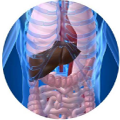 Everyone’s liver produces the protein alpha-1 antitrypsin (AAT). The job of AAT is to protect the body from inflammation, especially in the lungs. In people with Alpha-1 their AAT is malformed and cannot be released by their liver. Most commonly this leads to lung disease but the build up of AAT in the liver can also lead to liver disease.
Everyone’s liver produces the protein alpha-1 antitrypsin (AAT). The job of AAT is to protect the body from inflammation, especially in the lungs. In people with Alpha-1 their AAT is malformed and cannot be released by their liver. Most commonly this leads to lung disease but the build up of AAT in the liver can also lead to liver disease.
You now know that AAT is produced in the liver and that the AAT an alpha produces is abnormal. Unfortunately as previously mentioned, this means that it gets stuck in the liver and cannot be released into the bloodstream. For most people this added complication doesn’t cause many problems. However occasionally, the build up of the faulty AAT in the liver does cause damage, leading to liver disease usually involving cirrhosis, which is scarring of the liver.
It isn’t really understood why, but alpha babies can occasionally be born with serious liver disease due to the build up of AAT during their development in the womb. So rarely, liver problems become apparent very early in life, however, most alphas will never have liver disease, with just a few experiencing symptoms later in life.
Signs & symptoms of A1AD related liver disease
- Family history of liver disease.
- Unexplained liver problems.
- Elevated liver enzymes.
Will my child have serious liver problems
Unfortunately this is something which cannot be accurately predicted, studies have shown that around 15% of babies born with A1AD had some liver problems in infancy. By following up these children throughout childhood it was found that:
- 25% had no symptoms of liver disease at the age of 10.
- 45% had some indicators of liver disease in blood test results.
- 5% had serious disease and needed a liver transplant during their first year of life.
- The remaining 25% needed a liver transplant at some point during their during childhood. These were the children whose liver disease had progressed and the liver had become permanently damaged by severe scarring of the tissue (cirrhosis).
Remember, the figures for transplant are actually very small compared to the total number of alpha babies born. However for those who do need a transplant, liver transplantation in children is often very successful and survival rates are very encouraging.
Will liver problems develop later?
As already mentioned most alpha children do not have any significant problems, other than a predisposition for picking up colds and ‘flu. However occasionally, children do develop liver problems, for some this may may not become apparent until the child is older when they could develop some of the following symptoms:
- Jaundice
- Ascites: This is a swelling of the abdomen caused by a bulid up of fluid.
- Portal hypertension: This means there is increased pressure in some internal blood vessels caused by scarring of the liver. This may result in blood being vomited or passed in the stools.
Some children may also be found to have an abnormality of the kidneys. This doesn’t usually intefere with kidney function but it may increase the risk of kidney problems if a transplant is needed.
